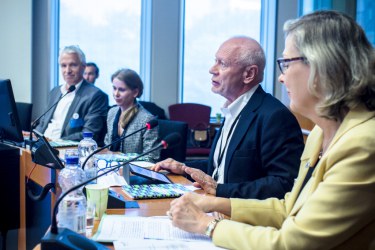As part of our advocacy campaign for science engagement in the next EU Framework Programme for Research and Innovation (Horizon Europe), Ecsite held an event at the European Parliament yesterday - an invitation by Polish MEP Michał Boni, together with Ecsite and the Copernicus Science Centre.
The event began with three speeches from MEP Michał Boni; Signe Ratso, Deputy Director-General of the European Commission's Directorate-General "Research and Innovation"; and Ecsite President Herbert Münder.
Michał Boni started by explaining that while the current provision for Research and Innovation in the European Union budget's first draft is satisfactory, this is by no means a given: advocacy will be needed, in particular at member state level, to keep this provision in the final budget. Turning his attention to Horizon Europe, he underlined that "there can be no innovation without innovators" and that citizens are increasingly demanding to be "co-creators of technology, not consumers", a process which science engagement can facilitate.
Sharing insights about current work going on at the European Commission on the first Horizon Europe programme draft (expected to be released early June), Signe Ratso gave positive signals about the continuation of a science and society component. Quoting feedback received from the High Level expert group that delivered a mid term report on the Horizon 2020 (current) framework, she underlined that the involvement of citizens, both in agenda setting and in implementation, was one of the identified areas for improvement. She also shared preliminary results from a public consultation on Horizon Europe's mission-driven approach that state that 66% of respondents view citizens' involvement in research as something positive.
For his part, Ecsite President Herbert Münder insisted on science engagement organisations' role in supporting mutual trust between science and society; the necessity of life-long learning; and the multifaceted forms science engagement can take.
The second part of the event consisted in a workshop, facilitated by representatives from the Ecsite Board and from Ecsite member organisations and based on Ecsite's position paper entitled "Together for a democratic and sustainable Europe".
If science engagement is crucial to the innovation system, we asked, what should Horizon Europe do to support it? How can we restore trust between science and society and combat fake news? How do we make sure that emerging technologies reflect the needs and values of European citizens? How do we encourage youth to choose scientific careers? Key challenges for the future of science and society we introduced. Using an interactive engagement format, a discussion unfolded along five thematic strands, identifying how Horizon Europe can successfully encourage the public to take a more active – and positive - role in science. Attendees brainstormed "dreams and nightmares" for Horizon Europe, revealing their vision for the future of science engagement in Europe. Phrases heard in the room: "reducing inequalities", "closing gaps", "building on past successes", "youth as a mission", "building confidence", "using science engagement organisations' trust from the public to enable dialogue"...
"When we talk about science engagement, we talk about a new model for society", concluded Boni. "Education should not suffocate curiosity", echoed Ratso.
Background: more on Ecsite's advocacy campaign here and about the EU Framework Programme legislative process here.
Discover the Flickr album of the event here.





